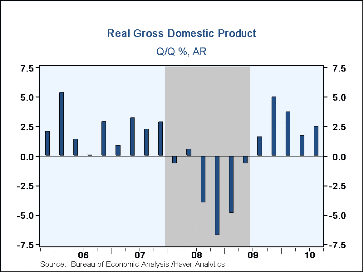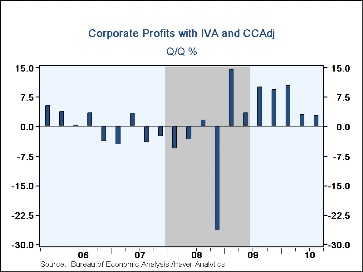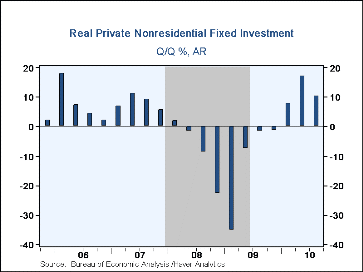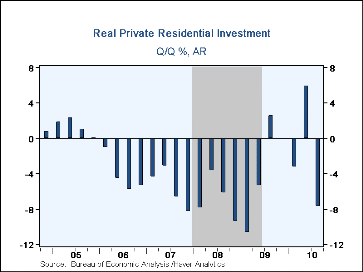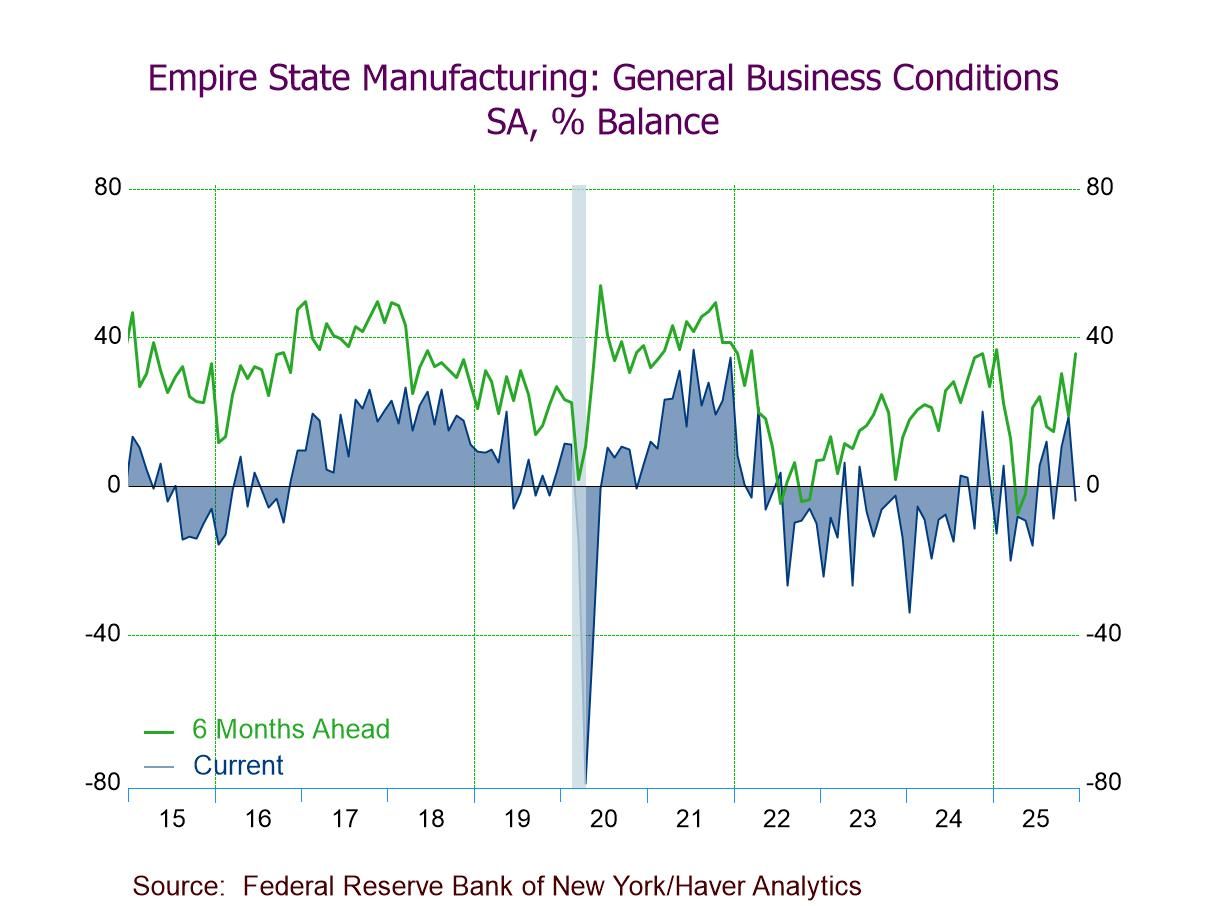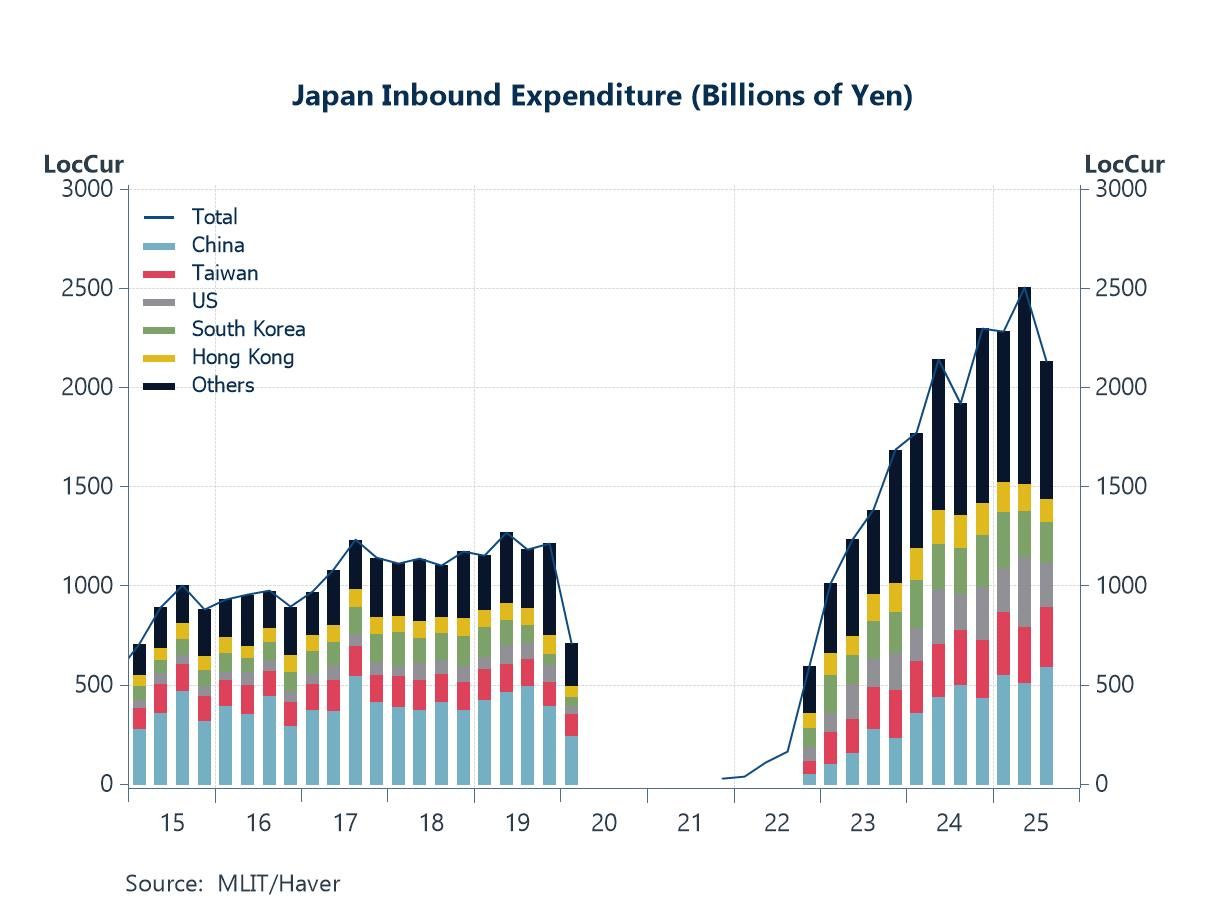 Global| Nov 23 2010
Global| Nov 23 2010U.S. GDP Growth Revised Up; Corporate Profit Gain Is Modest
by:Tom Moeller
|in:Economy in Brief
Summary
Real GDP increased 2.5% (SAAR) last quarter which was slightly better than the advance report of a 2.0% rise. The gain roughly matched expectations for a 2.4% rise according to the Bloomberg survey. So far since the last recession GDP [...]
Real GDP increased 2.5% (SAAR) last quarter which was slightly better than the advance report of a 2.0% rise. The gain roughly matched expectations for a 2.4% rise according to the Bloomberg survey. So far since the last recession GDP growth has averaged 2.9%, a figure that is less than half the average following other, severe, postwar recessions.
Last quarter's gain in GDP was accompanied by another moderate rise in corporate profits, reported for the first time. The 2.8% rise (27.8% y/y) roughly matched the Q2 increase. Lower interest rates helped financial sector earnings to rise 10.0% (28.5% y/y). Only moderate economic growth and weak pricing power reduced the gain in nonfinancial sector earnings to 2.1% (40.2% y/y) but profits from the rest of the world fell 1.9% (+5.4% y/y).
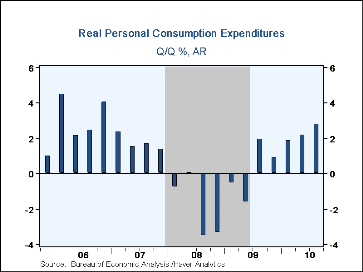 The improved GDP growth estimate reflected broad-based, but modest, upward
revisions amongst categories. Personal consumption growth was notched up to a
still-modest 2.9% while business investment remained the firmest at 10.3%.
Government spending also was revised higher and the drop in residential
investment was lessened to a still substantial 27.5% which more-than-reversed
the Q2 increase.
The improved GDP growth estimate reflected broad-based, but modest, upward
revisions amongst categories. Personal consumption growth was notched up to a
still-modest 2.9% while business investment remained the firmest at 10.3%.
Government spending also was revised higher and the drop in residential
investment was lessened to a still substantial 27.5% which more-than-reversed
the Q2 increase.
Last quarter's contribution to GDP growth from a deeper foreign trade deficit was lessened to -1.8 percentage points as exports grew at a 6.3% annual rate (12.6% y/y) but imports rose at a 16.8% rate (16.1% y/y). Hardly revised was the 1.3 percentage point contribution to growth from faster accumulation of inventories.
Price inflation as measured by the chained GDP price index was held steady at 2.3% and the 1.2% yearly advance was near the lows of the early-1960s. The personal consumption chain price index rose an unchanged 1.0% (1.4% y/y). The price index for fixed business investment rose by 0.1% q/q (-1.1% y/y) and the residential investment price index fell marginally (+0.3% y/y) and that compares to a 3.4% decline during all of last year. The GDP figures are available in Haver's USECON and USNA databases and the expectations number is in MMSAMER.
Disagreement at the FOMC: The Dissenting Votes Are Just Part of the Story from the Federal Reserve Bank of St. Louis can be found here.
| Chained 2005 $, % AR | Q3 '10 (Prelim) | Q3 '10 (Adv) | Q2 '10 | Q1 '10 | Q3 Y/Y | 2009 | 2008 | 2007 |
|---|---|---|---|---|---|---|---|---|
| GDP | 2.5 | 2.0 | 1.7 | 3.7 | 3.2 | -2.6 | -0.0 | 1.9 |
| Inventory Effect | 1.3 | 1.4 | 0.8 | 2.6 | 1.9 | -0.5 | -0.5 | -0.3 |
| Final Sales | 1.2 | 0.6 | 0.9 | 1.1 | 1.3 | -2.1 | 0.5 | 2.2 |
| Foreign Trade Effect | -1.8 | -2.0 | -3.5 | -0.3 | -0.9 | 1.0 | -1.1 | 0.7 |
| Domestic Final Demand | 2.9 | 2.5 | 4.3 | 1.3 | 2.2 | -3.1 | -0.6 | 1.5 |
| Demand Components | ||||||||
| Personal Consumption | 2.8 | 2.6 | 2.2 | 1.9 | 2.0 | -1.2 | -0.3 | 2.4 |
| Business Fixed Investment | 10.3 | 9.8 | 17.2 | 7.8 | 8.3 | -17.1 | 0.3 | 6.7 |
| Residential Investment | -27.5 | -29.1 | 25.6 | -12.3 | -5.6 | -22.9 | -24.0 | -18.7 |
| Government Spending | 4.0 | 3.3 | 3.9 | -1.6 | 1.2 | 1.6 | 2.8 | 1.3 |
| Prices | ||||||||
| Chained GDP Price Index | 2.3 | 2.3 | 1.9 | 1.0 | 1.2 | 0.9 | 2.2 | 2.9 |
Tom Moeller
AuthorMore in Author Profile »Prior to joining Haver Analytics in 2000, Mr. Moeller worked as the Economist at Chancellor Capital Management from 1985 to 1999. There, he developed comprehensive economic forecasts and interpreted economic data for equity and fixed income portfolio managers. Also at Chancellor, Mr. Moeller worked as an equity analyst and was responsible for researching and rating companies in the economically sensitive automobile and housing industries for investment in Chancellor’s equity portfolio. Prior to joining Chancellor, Mr. Moeller was an Economist at Citibank from 1979 to 1984. He also analyzed pricing behavior in the metals industry for the Council on Wage and Price Stability in Washington, D.C. In 1999, Mr. Moeller received the award for most accurate forecast from the Forecasters' Club of New York. From 1990 to 1992 he was President of the New York Association for Business Economists. Mr. Moeller earned an M.B.A. in Finance from Fordham University, where he graduated in 1987. He holds a Bachelor of Arts in Economics from George Washington University.


